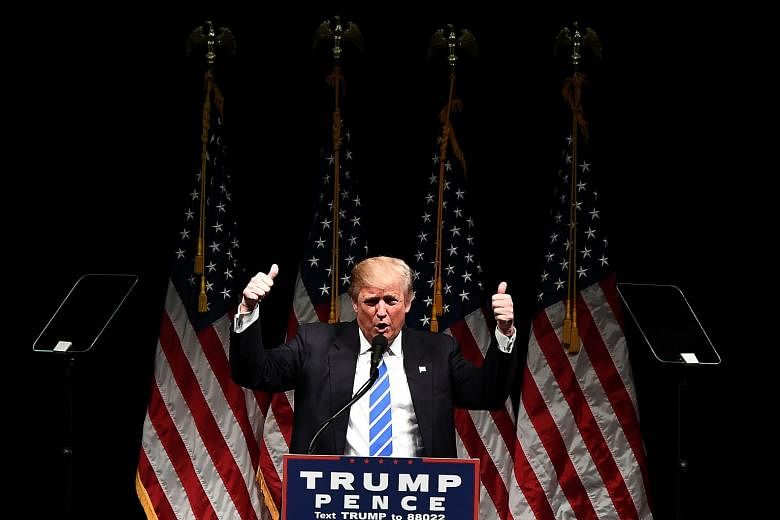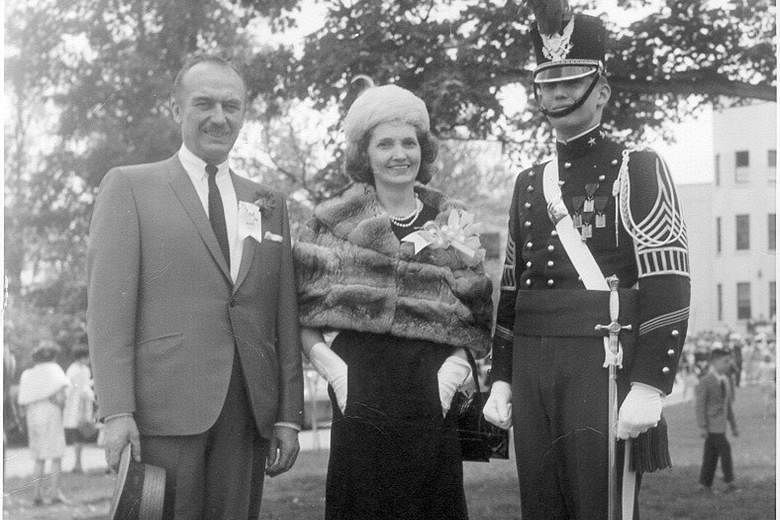Long before he descended that infamous golden escalator and took the American political world by storm, Mr Donald Trump was already a household name.
Blessed with strong natural instincts on what sells, a good work ethic and a no-holds-barred approach to negotiation, the real estate mogul built one of the country's most famous property empires.
But as he seeks to become the first political outsider to get elected to the Oval Office, Mr Trump is finding that some of his unseemly practices - which invited less scrutiny when he was a tycoon and showman - have become serious liabilities.
Though he enters the final days of the race with momentum on his side, Mr Trump remains very much the underdog to Mrs Hillary Clinton. His numerous controversies - especially those relating to his treatment of women - combined with a track record of insulting innumerable people, has left him struggling to expand his support base in a country that is increasingly diverse.
To win, he will now need to sweep the map, securing every single major battleground - Nevada, Iowa, Florida, Ohio and North Carolina - then hope to flip a Democrat leaning-state. While that had seemed like an impossibility a few weeks ago, he has narrowed the gaps in states like New Hampshire and Colorado - giving him a difficult but viable path over the line.
-
TRUMP'S SCANDALS
-
SEXUAL ASSAULT AND THAT BRAGGING VIDEO
One of the low points of Mr Donald Trump's campaign was the release of a 2005 video from the show Access Hollywood, showing the tycoon bragging about kissing and grabbing women without consent.
The video, which he dismissed as "locker room talk", was later followed by a long list of women coming forward to accuse Mr Trump of doing exactly what he boasted about doing.
He denied all allegations but the episode did no favours for a candidate already struggling to win over women voters.
The allegations make this the most damaging of the many Trump scandals.
TRUMP UNIVERSITY
Mr Trump started an eponymous university in 2005, promising to teach students the secrets of his real estate success.
However, many who paid thousands to sign up soon started complaining that the university was not living up to its promises. They said Mr Trump had little to do with the content and that they were pressured to give positive reviews.
The school shut down in 2010 but is the subject of several class action lawsuits. Mr Trump also created a separate controversy earlier this year when he said a judge dealing with one of the suits would be biased because of his Mexican ethnicity.
TAXES
Mr Trump looks set to be the first presidential candidate in nearly 40 years not to reveal his tax returns. Though he said he would release his tax documents after a government audit is over, critics suspect the tycoon is more concerned about what it would reveal.
A New York Times report, based on leaked pages of Mr Trump's tax returns, found that the mogul chalked up losses of nearly US$1 billion in the 1990s and could have used that to escape paying personal income taxes for up to 18 years, even though he has recovered financially. It also found he may have used some legally dubious tactics to avoid paying taxes.
If he pulls off the unlikely feat, it will be hailed as the most stunning comeback in American presidential election history. Yet, if Mr Trump's history is any guide, this is a man who knows how to make a comeback.
BEFORE POLITICS
Mr Trump was one of five children born to New York real estate developer Fred Trump and Mary MacLeod Trump. Though accounts describe the elder Trump as having passed down many characteristics to his son, Mr Donald Trump rarely speaks about his family and his childhood growing up in Queens, New York.
The few times he has spoken about his father, it was only to the extent of calling him "very tough" and "very difficult". The elder Trump was well-connected politically and was known for being good at manipulating laws to his benefit without ever breaking them.
With his children, he was indeed tough. When the younger Trump started to act up at age 12 - he apparently loved to fight - his father yanked him out of a cushy private school and moved him to the New York Military Academy.
It was at the academy that Mr Trump would really start coming into his own and he would credit the environment with giving him his ruthless streak. On the wall of the academy's baseball team's locker room was a quote from American football legend Vince Lombardi that particularly spoke to the young Trump: "Winning isn't everything, it's the only thing."
Another influence on Mr Trump early on was the pastor of his church in Manhattan, Dr Norman Vincent Peale. Dr Peale would go on to write a famous book titled The Power Of Positive Thinking.
The lasting impact of the emphasis on winning can be seen through much of Mr Trump's adult life. His tennis coach told Playboy Magazine this year that Mr Trump tried to hit winners with every shot rather than bide his time. And when his coach taught him to play more strategically, he quit. "I don't have the patience for it," he said. "When I changed my game, I lost interest. I like trying to hit winners all the time. I liked it better that way."
Upon graduating from the military academy, Mr Trump went to Fordham University in New York and later transferred to the prestigious Wharton School of Business at the University of Pennsylvania.
Though the Vietnam War draft took place during his college years, Mr Trump was able to avoid being sent to war because of a condition called heel spurs.
After graduating in 1968, he started his own real estate business with a "small" US$1 million (S$1.4 million) loan from his father.
When he took over the family business in 1971, he set about remaking the company from a successful, if low-key, developer of apartments in Queens and Brooklyn, into a glitzy Manhattan brand. He sought out high-profile projects in Manhattan and also placed an emphasis on branding. Though 17 buildings in New York now bear his name in large gold letters, he owns only a handful of them. Even the gleaming Trump Tower on Fifth Avenue, the most famous of the Trump buildings, is only partially owned by the billionaire.He would later expand his empire to include casinos, golf courses, an airline, the controversial Trump University and even a failed line of steaks.
Like his father, Mr Trump did not always behave ethically, and many questions remain to this day about his business practices. He declared bankruptcy many times, often leaving debtors and contractors holding the bag. He was sued by the city for discrimination against minority tenants. He also has an outstanding lawsuit over whether his university had defrauded its students.
Mr Trump also faced a low point when the real estate market declined in 1990, with the Trump Organisation depending on loans to stay afloat. But the businessman would make a comeback within a decade, reversing what was reported as a nearly US$1 billion deficit. That deficit would this year become an election issue amid claims that he used it to avoid paying taxes long after he had recovered financially.
In 2004, Mr Trump embarked on a new project that would make him a household name around the world: a reality TV show known as The Apprentice.
In his personal life, he would marry three times, having five children.
POLITICAL EDUCATION
Mr Trump's emergence on the political scene may have felt a little like a bolt out of the blue, but he has actually had a three-decade long history of toying with the idea of a run.
Last year was the sixth time he had played around with the idea, which started in 1987. Most regarded the talk at the time as a publicity stunt to drum up interest in his newly published book The Art Of The Deal.
During that time, he occasionally got his political views heard. In 1987, Mr Trump spent nearly US$100,000 buying full-page ads in The New York Times, Washington Post and Boston Globe criticising American foreign policy.
In particular, he argued that the United States should get reimbursed for defending allies like Japan, an argument that he would revive this year.
Yet, his coming-out party as a political figure took place in 2011 when he positioned himself as the strongest, most public voice of a movement known as "Birthers". He repeatedly publicly expressed doubts over whether President Barack Obama was born in the US and continued to do so even after the President released his birth certificate. He would only rescind those claims this year, when it was clear his position was hurting his campaign among the black community.
MAKING HISTORY
When Mr Trump officially threw his hat in the presidential ring on June 16 last year, few took him seriously. When he joined the crowded field of Republicans vying for the nomination of the party, he was polling below 5 per cent.
Yet, with each passing month, he kept rising in the polls, beating out some highly qualified senators and former governors. Though he kept making headlines for a string of controversial statements, his popularity was never quelled.
He defied every prediction made about his demise and went on to chalk up a series of impressive wins in the primaries. He effectively wrapped up the nomination with a win in Indiana in May, though a faction of his own party continued to plot ways to unseat him all the way to the convention in July. Despite some last-minute attempts to derail the nomination at the convention, Mr Trump became the first political outsider in 70 years to be the presidential nominee of a major party.
If he is victorious this week, this unexpected candidate would cap his unexpected campaign with a fittingly unexpected outcome.



